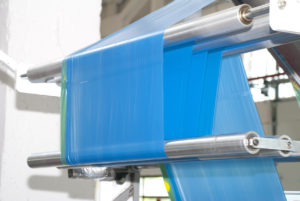Products of all kinds are packaged in it. There’s probably something made of it within reach of you right now. Polypropylene is, quite literally, everywhere. It’s a versatile and recyclable type of plastic, and demand for it is growing. The global polypropylene market is expected to be worth $133.3 billion by the end of 2023, up from at $81.6 billion in 2014, according to Transparency Market Research.
Because of the popularity of this product, and the growing public interest in recycling and sustainability, polypropylene pops up in the news fairly often – and we’re not just talking about industry trades.
A Big Deal Over Small Lids
One of the world’s most popular chains made headlines in 2018 with a pledge related to polypropylene. In its quest to dramatically cut down on the use of plastic straws, Starbucks put designers to work creating a strawless lid for cold drinks. The final product, which has been frequently described as a “sippy cup lid” for its similarity to lids used on kids’ drinks, is made from polypropylene. Starbucks promises that the lids can be widely recycled, unlike its plastic straws.

Few consumers have encountered these lids so far, as Starbucks initially introduced them only in Seattle and Vancouver, BC. This summer, the chain plans to start using the polypropylene lids in stores in Los Angeles, San Francisco, Indianapolis, Toronto and Washington, D.C. If everything goes according to plan, Starbucks will roll out its strawless lids across the country in 2020.
Starbucks already uses polypropylene to make its reusable plastic cups, which consumers get discounts for filling. The company introduced the cups in its Asian stores on Earth Day this year. The polypropylene cups are now available in more than a dozen countries throughout Asia.
More Polypropylene News
Starbucks is far from the only major corporation that’s changing how it uses polypropylene. As companies attempt to balance environmental concerns with cost-saving measures, and as more consumers become educated about recycling options, we’re seeing a lot of conversations about polypropylene.
- In April of this year, Albertsons grocery chain pledged to reduce its use of plastic packaging. Starting with a pilot program in its Southern California stores, the retailer plans to start recycling the polypropylene crates that are used to transport products like fruits and vegetables. Stores participating in the pilot program turn their crates over to recyclers. The recyclers turn the crates into plastic pellets that are then used to create new crates.
- The growing plastic bag ban movement could affect the polypropylene market in coming years. California and Hawaii have already banned stores from giving customers single-use plastic bags at checkout. New York joined them this year with the passage of its statewide plastic bag ban, which goes into effect in 2020. Major cities including Boston and Chicago have already put their own bans into effect, and other cities and states are in the process of passing similar legislation. Customers who can no longer get their purchases bagged in plastic are encouraged to buy reusable plastic totes, which are commonly made of polypropylene. Statewide plastic bag bans could boost demand for this material.
- Tim Hortons, perhaps taking a page from Starbucks, introduced its new polypropylene lids in May of this year. The company, which operates coffee chains throughout Canada and the U.S., said that the new lids were developed with the intention of preventing spills, but the recyclability of polypropylene was a factor too. According to Tim Hortons, 95 percent of Canadian curbside recycling programs accept polypropylene. Consumers can also recycle the lids in Tim Hortons stores.
It’s worth noting that – despite what the Starbucks and Tim Hortons PR teams say – critics have been vocal in their objections to polypropylene lids. They cite the low recycling rate for plastic in North America, which hovers around 9 percent. (This is in spite of the fact that most curbside recycling programs will take polypropylene.) The fact that these lids can be recycled doesn’t mean they will be recycled, critics point out.
Polypropylene is just one of the plastic types we accept and process at Miller Recycling. How can we help your business meet its plastic recycling needs? Contact us today to get a quote.

